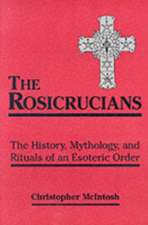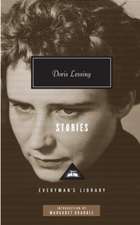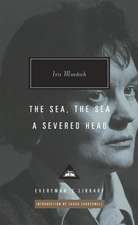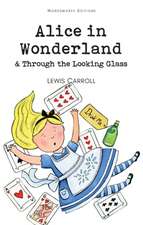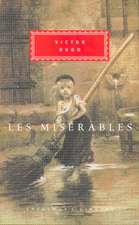Frankenstein
Autor Mary Wollstonecraft Shelleyen Limba Engleză Paperback – 9 mai 2020
Preț: 105.32 lei
Nou
Puncte Express: 158
Preț estimativ în valută:
20.16€ • 20.77$ • 17.02£
20.16€ • 20.77$ • 17.02£
Carte tipărită la comandă
Livrare economică 03-17 martie
Preluare comenzi: 021 569.72.76
Specificații
ISBN-13: 9781800601352
ISBN-10: 1800601352
Pagini: 202
Dimensiuni: 152 x 229 x 12 mm
Greutate: 0.34 kg
Editura: Mary Publishing Company
ISBN-10: 1800601352
Pagini: 202
Dimensiuni: 152 x 229 x 12 mm
Greutate: 0.34 kg
Editura: Mary Publishing Company
Descriere
Descriere de la o altă ediție sau format:
Conceived by Mary Shelley (wife of the famous poet Percy Shelley) on the banks of Lake Geneva in 1816, Frankenstein is today regarded as a classic piece of 19th century literature.
The book includes an illustrated Character List (like a Dramatis Personae), 124 pages of story artwork, and fascinating support material that details the remarkable and tragic life of Mary Shelley - all beautifully presented in color.
Designed to encourage readers to enjoy classical literature, titles in the Classical Comics range stay true to the original vision of the authors.
This title has been moderately and sympathetically abridged from the original text to fit within the graphic novel format. Despite that, all of the events of the book are represented, and all the captions and dialogue is taken from teh Shelley original prose novel.
The story begins with the journey of an adventurer, Robert Walton, who stumbles across a man in trouble at the North Pole, saving his life. That man is Victor Frankenstein, who tells Walton all about his experiments with the creation of life and how he came to be at the North Pole in the first place.
Through this plot structure, Mary Shelley was able to deal with serious real-world issues, such as the need for acceptance, tolerance, and understanding despite differences, as well as the need for companionship and love among our basic human needs.
The novel was of course, the inspiration and basis for the classic Boris Karloff movies, and more recently, the Frankenstein novels by Dean Koontz – however this Classical Comics publication, like all of their titles, remains true to the original novel.
Frankenstein is one of Classical Comics best selling titles, and now this edition presents it into a library binding.
To support the use of this title in the classroom, photocopiable teachers resources are available that offer lesson plans and activities from 6th grade and up: ISBN 978-1-906332-56-3
The book includes an illustrated Character List (like a Dramatis Personae), 124 pages of story artwork, and fascinating support material that details the remarkable and tragic life of Mary Shelley - all beautifully presented in color.
Designed to encourage readers to enjoy classical literature, titles in the Classical Comics range stay true to the original vision of the authors.
This title has been moderately and sympathetically abridged from the original text to fit within the graphic novel format. Despite that, all of the events of the book are represented, and all the captions and dialogue is taken from teh Shelley original prose novel.
The story begins with the journey of an adventurer, Robert Walton, who stumbles across a man in trouble at the North Pole, saving his life. That man is Victor Frankenstein, who tells Walton all about his experiments with the creation of life and how he came to be at the North Pole in the first place.
Through this plot structure, Mary Shelley was able to deal with serious real-world issues, such as the need for acceptance, tolerance, and understanding despite differences, as well as the need for companionship and love among our basic human needs.
The novel was of course, the inspiration and basis for the classic Boris Karloff movies, and more recently, the Frankenstein novels by Dean Koontz – however this Classical Comics publication, like all of their titles, remains true to the original novel.
Frankenstein is one of Classical Comics best selling titles, and now this edition presents it into a library binding.
To support the use of this title in the classroom, photocopiable teachers resources are available that offer lesson plans and activities from 6th grade and up: ISBN 978-1-906332-56-3
Textul de pe ultima copertă
At this challenge, Mary Shelley began work on the 'ghost story' that was to evolve into the most celebrated horror novel in literary history. Frankenstein was published the next year and become the rage of London. In the generations since, the story of Victor Frankenstein and the monster he created has been read by millions all over the world. It has inspired hundreds of imitations, but it has never been equaled for its masterful manipulation of the elements of horror and suspense.
Notă biografică
Bernie Wrightson (1948–2017) was a comics illustrator and horror artist best known for cocreating Swamp Thing and his adaptation of the novel Frankenstein, both featuring his trademark intricate inking. He worked on Spider-Man, Batman, and The Punisher, among many others, as well as works including Frankenstein Alive, Alive; Dead, She Said; The Ghoul; and Doc Macabre, all cocreated with esteemed horror author Steve Niles. His bestselling collaborations with Stephen King on The Stand, The Dark Tower V: Wolves of the Calla, Creepshow, and Cycle of the Werewolf are considered fan favorites. As a conceptual artist, Bernie worked on many movies, particularly in the horror genre, including Ghostbusters, The Faculty, Galaxy Quest, Spider-Man, George Romero’s Land of the Dead, and Frank Darabont’s Stephen King film The Mist.
Stephen King is the author of more than sixty books, all of them worldwide bestsellers. His recent work includes Never Flinch (May 2025), the short story collection You Like It Darker (a New York Times Book Review top ten horror book of 2024), Holly (a New York Times Notable Book of 2023), Fairy Tale, Billy Summers, If It Bleeds, The Institute, Elevation, The Outsider, Sleeping Beauties (cowritten with his son Owen King), and the Bill Hodges trilogy: End of Watch, Finders Keepers, and Mr. Mercedes (an Edgar Award winner for Best Novel and a television series streaming on Peacock). His novel 11/22/63 was named a top ten book of 2011 by The New York Times Book Review and won the Los Angeles Times Book Prize for Mystery/Thriller. His epic works The Dark Tower, It, Pet Sematary, Doctor Sleep, and Firestarter are the basis for major motion pictures, with It now the highest-grossing horror film of all time. He is the recipient of the 2020 Audio Publishers Association Lifetime Achievement Award, the 2018 PEN America Literary Service Award, the 2014 National Medal of Arts, and the 2003 National Book Foundation Medal for Distinguished Contribution to American Letters. He lives in Bangor, Maine, with his wife, novelist Tabitha King.
Stephen King is the author of more than sixty books, all of them worldwide bestsellers. His recent work includes Never Flinch (May 2025), the short story collection You Like It Darker (a New York Times Book Review top ten horror book of 2024), Holly (a New York Times Notable Book of 2023), Fairy Tale, Billy Summers, If It Bleeds, The Institute, Elevation, The Outsider, Sleeping Beauties (cowritten with his son Owen King), and the Bill Hodges trilogy: End of Watch, Finders Keepers, and Mr. Mercedes (an Edgar Award winner for Best Novel and a television series streaming on Peacock). His novel 11/22/63 was named a top ten book of 2011 by The New York Times Book Review and won the Los Angeles Times Book Prize for Mystery/Thriller. His epic works The Dark Tower, It, Pet Sematary, Doctor Sleep, and Firestarter are the basis for major motion pictures, with It now the highest-grossing horror film of all time. He is the recipient of the 2020 Audio Publishers Association Lifetime Achievement Award, the 2018 PEN America Literary Service Award, the 2014 National Medal of Arts, and the 2003 National Book Foundation Medal for Distinguished Contribution to American Letters. He lives in Bangor, Maine, with his wife, novelist Tabitha King.
Recenzii
*Frankenstein: The Graphic Novel: Quick Text. ISBN 978-1-906332-50-1.
*Frankenstein: The Graphic Novel: Original Text. ISBN 978-1-906332-49-5.
illus. by Declan Shalvey.
While remaining true to the spirit of Shelley’s famous work, this adaptation allows readers to have it their way, savoring this horror classic with either the “Original Text,” or the “Quick Text,” a simplified abridgement. More than a straightforward retelling, this edition invites readers to explore important social issues such as alienation, the consequences and ethics of scientific studies, as well as the nature of creation and destruction. Rich and lustrous artwork remains the same in both versions. Bucolic mountainsides and charming villages are rendered in a classical European painting style. In stark contrast, horrific elements are depicted with grotesque angular figures in monochromatic tones. Excellent lettering enhances the narrative without distracting from the images. An especially nice feature is the use of boldface to highlight key words and phrases. A table of contents, based on the original three-volume edition, helps readers follow the story’s progression. Back matter includes a biography of Shelley, a description of the novel’s origin and history, and a clear description of comic-page creation for this remarkable edition. Reluctant readers who start with the “Quick Text” will probably be enticed to try the “Original Text” and continue to explore this exquisite rendition of a gothic classic.
—Barbara M. Moon, Suffolk Cooperative Library System, Bellport, NY
School Library Journal, May 2009
*Frankenstein: The Graphic Novel: Original Text. ISBN 978-1-906332-49-5.
illus. by Declan Shalvey.
While remaining true to the spirit of Shelley’s famous work, this adaptation allows readers to have it their way, savoring this horror classic with either the “Original Text,” or the “Quick Text,” a simplified abridgement. More than a straightforward retelling, this edition invites readers to explore important social issues such as alienation, the consequences and ethics of scientific studies, as well as the nature of creation and destruction. Rich and lustrous artwork remains the same in both versions. Bucolic mountainsides and charming villages are rendered in a classical European painting style. In stark contrast, horrific elements are depicted with grotesque angular figures in monochromatic tones. Excellent lettering enhances the narrative without distracting from the images. An especially nice feature is the use of boldface to highlight key words and phrases. A table of contents, based on the original three-volume edition, helps readers follow the story’s progression. Back matter includes a biography of Shelley, a description of the novel’s origin and history, and a clear description of comic-page creation for this remarkable edition. Reluctant readers who start with the “Quick Text” will probably be enticed to try the “Original Text” and continue to explore this exquisite rendition of a gothic classic.
—Barbara M. Moon, Suffolk Cooperative Library System, Bellport, NY
School Library Journal, May 2009
Extras
Chapter 1Chapter 1
I am by birth a Genevese, and my family is one of the most distinguished of that republic. My ancestors had been for many years counsellors and syndics, and my father had filled several public situations with honour and reputation. He was respected by all who knew him for his integrity and indefatigable attention to public business. He passed his younger days perpetually occupied by the affairs of his country; a variety of circumstances had prevented his marrying early, nor was it until the decline of life that he became a husband and the father of a family.
As the circumstances of his marriage illustrate his character, I cannot refrain from relating them. One of his most intimate friends was a merchant who, from a flourishing state, fell, through numerous mischances, into poverty. This man, whose name was Beaufort, was of a proud and unbending disposition and could not bear to live in poverty and oblivion in the same country where he had formerly been distinguished for his rank and magnificence. Having paid his debts, therefore, in the most honourable manner, he retreated with his daughter to the town of Lucerne, where he lived unknown and in wretchedness. My father loved Beaufort with the truest friendship and was deeply grieved by his retreat in these unfortunate circumstances. He bitterly deplored the false pride which led his friend to a conduct so little worthy of the affection that united them. He lost no time in endeavouring to seek him out, with the hope of persuading him to begin the world again through his credit and assistance.
Beaufort had taken effectual measures to conceal himself, and it was ten months before my father discovered his abode. Overjoyed at this discovery, he hastened to the house, which was situated in a mean street near the Reuss. But when he entered, misery and despair alone welcomed him. Beaufort had saved but a very small sum of money from the wreck of his fortunes, but it was sufficient to provide him with sustenance for some months, and in the meantime he hoped to procure some respectable employment in a merchant’s house. The interval was, consequently, spent in inaction; his grief only became more deep and rankling when he had leisure for reflection, and at length it took so fast hold of his mind that at the end of three months he lay on a bed of sickness, incapable of any exertion.
His daughter attended him with the greatest tenderness, but she saw with despair that their little fund was rapidly decreasing and that there was no other prospect of support. But Caroline Beaufort possessed a mind of an uncommon mould, and her courage rose to support her in her adversity. She procured plain work; she plaited straw and by various means contrived to earn a pittance scarcely sufficient to support life.
Several months passed in this manner. Her father grew worse; her time was more entirely occupied in attending him; her means of subsistence decreased; and in the tenth month her father died in her arms, leaving her an orphan and a beggar. This last blow overcame her, and she knelt by Beaufort’s coffin weeping bitterly, when my father entered the chamber. He came like a protecting spirit to the poor girl, who committed herself to his care; and after the interment of his friend he conducted her to Geneva and placed her under the protection of a relation. Two years after this event Caroline became his wife.
There was a considerable difference between the ages of my parents, but this circumstance seemed to unite them only closer in bonds of devoted affection. There was a sense of justice in my father’s upright mind which rendered it necessary that he should approve highly to love strongly. Perhaps during former years he had suffered from the late-discovered unworthiness of one beloved and so was disposed to set a greater value on tried worth. There was a show of gratitude and worship in his attachment to my mother, differing wholly from the doting fondness of age, for it was inspired by reverence for her virtues and a desire to be the means of, in some degree, recompensing her for the sorrows she had endured, but which gave inexpressible grace to his behaviour to her. Everything was made to yield to her wishes and her convenience. He strove to shelter her, as a fair exotic is sheltered by the gardener, from every rougher wind and to surround her with all that could tend to excite pleasurable emotion in her soft and benevolent mind. Her health, and even the tranquillity of her hitherto constant spirit, had been shaken by what she had gone through. During the two years that had elapsed previous to their marriage my father had gradually relinquished all his public functions; and immediately after their union they sought the pleasant climate of Italy, and the change of scene and interest attendant on a tour through that land of wonders, as a restorative for her weakened frame.
From Italy they visited Germany and France. I, their eldest child, was born at Naples, and as an infant accompanied them in their rambles. I remained for several years their only child. Much as they were attached to each other, they seemed to draw inexhaustible stores of affection from a very mine of love to bestow them upon me. My mother’s tender caresses and my father’s smile of benevolent pleasure while regarding me are my first recollections. I was their plaything and their idol, and something better—their child, the innocent and helpless creature bestowed on them by Heaven, whom to bring up to good, and whose future lot it was in their hands to direct to happiness or misery, according as they fulfilled their duties towards me. With this deep consciousness of what they owed towards the being to which they had given life, added to the active spirit of tenderness that animated both, it may be imagined that while during every hour of my infant life I received a lesson of patience, of charity, and of self-control, I was so guided by a silken cord that all seemed but one train of enjoyment to me.
For a long time I was their only care. My mother had much desired to have a daughter, but I continued their single offspring. When I was about five years old, while making an excursion beyond the frontiers of Italy, they passed a week on the shores of the Lake of Como. Their benevolent disposition often made them enter the cottages of the poor. This, to my mother, was more than a duty; it was a necessity, a passion—remembering what she had suffered, and how she had been relieved—for her to act in her turn the guardian angel to the afflicted. During one of their walks a poor cot in the foldings of a vale attracted their notice as being singularly disconsolate, while the number of half-clothed children gathered about it spoke of penury in its worst shape. One day, when my father had gone by himself to Milan, my mother, accompanied by me, visited this abode. She found a peasant and his wife, hardworking, bent down by care and labour, distributing a scanty meal to five hungry babes. Among these there was one which attracted my mother far above all the rest. She appeared of a different stock. The four others were dark-eyed, hardy little vagrants; this child was thin and very fair. Her hair was the brightest living gold, and despite the poverty of her clothing, seemed to set a crown of distinction on her head. Her brow was clear and ample, her blue eyes cloudless, and her lips and the moulding of her face so expressive of sensibility and sweetness that none could behold her without looking on her as of a distinct species, a being heaven-sent, and bearing a celestial stamp in all her features.
The peasant woman, perceiving that my mother fixed eyes of wonder and admiration on this lovely girl, eagerly communicated her history. She was not her child, but the daughter of a Milanese nobleman. Her mother was a German and had died on giving her birth. The infant had been placed with these good people to nurse; they were better off then. They had not been long married, and their eldest child was but just born. The father of their charge was one of those Italians nursed in the memory of the antique glory of Italy—one among the schiavi ognor frementi, who exerted himself to obtain the liberty of his country. He became the victim of its weakness. Whether he had died or still lingered in the dungeons of Austria was not known. His property was confiscated; his child became an orphan and a beggar. She continued with her foster parents and bloomed in their rude abode, fairer than a garden rose among dark-leaved brambles.
When my father returned from Milan, he found playing with me in the hall of our villa a child fairer than pictured cherub—a creature who seemed to shed radiance from her looks and whose form and motions were lighter than the chamois of the hills. The apparition was soon explained. With his permission my mother prevailed on her rustic guardians to yield their charge to her. They were fond of the sweet orphan. Her presence had seemed a blessing to them, but it would be unfair to her to keep her in poverty and want when Providence afforded her such powerful protection. They consulted their village priest, and the result was that Elizabeth Lavenza became the inmate of my parents’ house—my more than sister—the beautiful and adored companion of all my occupations and my pleasures.
Everyone loved Elizabeth. The passionate and almost reverential attachment with which all regarded her became, while I shared it, my pride and my delight. On the evening previous to her being brought to my home, my mother had said playfully, “I have a pretty present for my Victor—tomorrow he shall have it.” And when, on the morrow, she presented Elizabeth to me as her promised gift, I, with childish seriousness, interpreted her words literally and looked upon Elizabeth as mine—mine to protect, love, and cherish. All praises bestowed on her I received as made to a possession of my own. We called each other familiarly by the name of cousin. No word, no expression could body forth the kind of relation in which she stood to me—my more than sister, since till death she was to be mine only.
I am by birth a Genevese, and my family is one of the most distinguished of that republic. My ancestors had been for many years counsellors and syndics, and my father had filled several public situations with honour and reputation. He was respected by all who knew him for his integrity and indefatigable attention to public business. He passed his younger days perpetually occupied by the affairs of his country; a variety of circumstances had prevented his marrying early, nor was it until the decline of life that he became a husband and the father of a family.
As the circumstances of his marriage illustrate his character, I cannot refrain from relating them. One of his most intimate friends was a merchant who, from a flourishing state, fell, through numerous mischances, into poverty. This man, whose name was Beaufort, was of a proud and unbending disposition and could not bear to live in poverty and oblivion in the same country where he had formerly been distinguished for his rank and magnificence. Having paid his debts, therefore, in the most honourable manner, he retreated with his daughter to the town of Lucerne, where he lived unknown and in wretchedness. My father loved Beaufort with the truest friendship and was deeply grieved by his retreat in these unfortunate circumstances. He bitterly deplored the false pride which led his friend to a conduct so little worthy of the affection that united them. He lost no time in endeavouring to seek him out, with the hope of persuading him to begin the world again through his credit and assistance.
Beaufort had taken effectual measures to conceal himself, and it was ten months before my father discovered his abode. Overjoyed at this discovery, he hastened to the house, which was situated in a mean street near the Reuss. But when he entered, misery and despair alone welcomed him. Beaufort had saved but a very small sum of money from the wreck of his fortunes, but it was sufficient to provide him with sustenance for some months, and in the meantime he hoped to procure some respectable employment in a merchant’s house. The interval was, consequently, spent in inaction; his grief only became more deep and rankling when he had leisure for reflection, and at length it took so fast hold of his mind that at the end of three months he lay on a bed of sickness, incapable of any exertion.
His daughter attended him with the greatest tenderness, but she saw with despair that their little fund was rapidly decreasing and that there was no other prospect of support. But Caroline Beaufort possessed a mind of an uncommon mould, and her courage rose to support her in her adversity. She procured plain work; she plaited straw and by various means contrived to earn a pittance scarcely sufficient to support life.
Several months passed in this manner. Her father grew worse; her time was more entirely occupied in attending him; her means of subsistence decreased; and in the tenth month her father died in her arms, leaving her an orphan and a beggar. This last blow overcame her, and she knelt by Beaufort’s coffin weeping bitterly, when my father entered the chamber. He came like a protecting spirit to the poor girl, who committed herself to his care; and after the interment of his friend he conducted her to Geneva and placed her under the protection of a relation. Two years after this event Caroline became his wife.
There was a considerable difference between the ages of my parents, but this circumstance seemed to unite them only closer in bonds of devoted affection. There was a sense of justice in my father’s upright mind which rendered it necessary that he should approve highly to love strongly. Perhaps during former years he had suffered from the late-discovered unworthiness of one beloved and so was disposed to set a greater value on tried worth. There was a show of gratitude and worship in his attachment to my mother, differing wholly from the doting fondness of age, for it was inspired by reverence for her virtues and a desire to be the means of, in some degree, recompensing her for the sorrows she had endured, but which gave inexpressible grace to his behaviour to her. Everything was made to yield to her wishes and her convenience. He strove to shelter her, as a fair exotic is sheltered by the gardener, from every rougher wind and to surround her with all that could tend to excite pleasurable emotion in her soft and benevolent mind. Her health, and even the tranquillity of her hitherto constant spirit, had been shaken by what she had gone through. During the two years that had elapsed previous to their marriage my father had gradually relinquished all his public functions; and immediately after their union they sought the pleasant climate of Italy, and the change of scene and interest attendant on a tour through that land of wonders, as a restorative for her weakened frame.
From Italy they visited Germany and France. I, their eldest child, was born at Naples, and as an infant accompanied them in their rambles. I remained for several years their only child. Much as they were attached to each other, they seemed to draw inexhaustible stores of affection from a very mine of love to bestow them upon me. My mother’s tender caresses and my father’s smile of benevolent pleasure while regarding me are my first recollections. I was their plaything and their idol, and something better—their child, the innocent and helpless creature bestowed on them by Heaven, whom to bring up to good, and whose future lot it was in their hands to direct to happiness or misery, according as they fulfilled their duties towards me. With this deep consciousness of what they owed towards the being to which they had given life, added to the active spirit of tenderness that animated both, it may be imagined that while during every hour of my infant life I received a lesson of patience, of charity, and of self-control, I was so guided by a silken cord that all seemed but one train of enjoyment to me.
For a long time I was their only care. My mother had much desired to have a daughter, but I continued their single offspring. When I was about five years old, while making an excursion beyond the frontiers of Italy, they passed a week on the shores of the Lake of Como. Their benevolent disposition often made them enter the cottages of the poor. This, to my mother, was more than a duty; it was a necessity, a passion—remembering what she had suffered, and how she had been relieved—for her to act in her turn the guardian angel to the afflicted. During one of their walks a poor cot in the foldings of a vale attracted their notice as being singularly disconsolate, while the number of half-clothed children gathered about it spoke of penury in its worst shape. One day, when my father had gone by himself to Milan, my mother, accompanied by me, visited this abode. She found a peasant and his wife, hardworking, bent down by care and labour, distributing a scanty meal to five hungry babes. Among these there was one which attracted my mother far above all the rest. She appeared of a different stock. The four others were dark-eyed, hardy little vagrants; this child was thin and very fair. Her hair was the brightest living gold, and despite the poverty of her clothing, seemed to set a crown of distinction on her head. Her brow was clear and ample, her blue eyes cloudless, and her lips and the moulding of her face so expressive of sensibility and sweetness that none could behold her without looking on her as of a distinct species, a being heaven-sent, and bearing a celestial stamp in all her features.
The peasant woman, perceiving that my mother fixed eyes of wonder and admiration on this lovely girl, eagerly communicated her history. She was not her child, but the daughter of a Milanese nobleman. Her mother was a German and had died on giving her birth. The infant had been placed with these good people to nurse; they were better off then. They had not been long married, and their eldest child was but just born. The father of their charge was one of those Italians nursed in the memory of the antique glory of Italy—one among the schiavi ognor frementi, who exerted himself to obtain the liberty of his country. He became the victim of its weakness. Whether he had died or still lingered in the dungeons of Austria was not known. His property was confiscated; his child became an orphan and a beggar. She continued with her foster parents and bloomed in their rude abode, fairer than a garden rose among dark-leaved brambles.
When my father returned from Milan, he found playing with me in the hall of our villa a child fairer than pictured cherub—a creature who seemed to shed radiance from her looks and whose form and motions were lighter than the chamois of the hills. The apparition was soon explained. With his permission my mother prevailed on her rustic guardians to yield their charge to her. They were fond of the sweet orphan. Her presence had seemed a blessing to them, but it would be unfair to her to keep her in poverty and want when Providence afforded her such powerful protection. They consulted their village priest, and the result was that Elizabeth Lavenza became the inmate of my parents’ house—my more than sister—the beautiful and adored companion of all my occupations and my pleasures.
Everyone loved Elizabeth. The passionate and almost reverential attachment with which all regarded her became, while I shared it, my pride and my delight. On the evening previous to her being brought to my home, my mother had said playfully, “I have a pretty present for my Victor—tomorrow he shall have it.” And when, on the morrow, she presented Elizabeth to me as her promised gift, I, with childish seriousness, interpreted her words literally and looked upon Elizabeth as mine—mine to protect, love, and cherish. All praises bestowed on her I received as made to a possession of my own. We called each other familiarly by the name of cousin. No word, no expression could body forth the kind of relation in which she stood to me—my more than sister, since till death she was to be mine only.












